[*Try this*] You are the Ref!
-
Keith Hackett's verdict
1) Other than making sure people don't go over the top and lose their tempers, you should let play continue. This is a problem for the manager to resolve. He can remove the player and continue with ten men if he likes – but all you can do is offer some operational advice to both of them to avoid any escalation.
2) Allow the goalkeeper to be replaced by a named substitute. It is only the goalkeeper, if injured, who can be replaced in the penalty shoot-out.
3) Play on. You need to think quickly, and your judgment here should be that the defender did not deliberately kick the ball to his goalkeeper. Yes, he may have intended to, but you cannot read the defender's mind and guess whether he intended a back-pass or a corner-kick when under pressure: you must base your decision on the facts in front of you.
-
hey people, i thought this might be interesting, you might just want to try being in a ref's position.
do not check out the answers first, see if you can get it right.
good luck have fun!

-
98. Owen Coyle, 2010
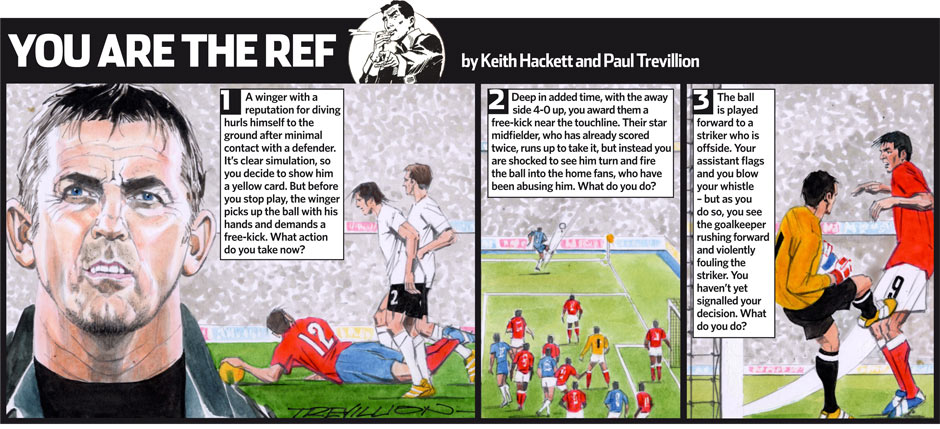
Click to enlarge, and debate the strip below the line.Keith Hackett's answers
1) This is one incident, not two, so you would not show two yellow cards followed by a red. Show him one yellow for unsporting behaviour – in this case simulation, attempting to deceive. Restart play with an indirect free-kick to the defence.
2) Show him a red card for violent conduct and restart play with an indirect free-kick to the opposition. You should also take a moment to call over the stadium manager, and request that the number of stewards near the incident is increased. After the game, report the incident to the authorities.
3) You can deal with both offences here: the first offence, offside, is punished by restarting with an indirect free-kick to the defending side. The second offence, violent conduct, is punished by showing the goalkeeper a red card. The fact that you were stopping play for an offside doesn't mean you can't also punish a separate violent incident. Wait for another player to replace the keeper in goal before restarting play. -
Intresting! Post more =)
-
Originally posted by sand king:
Intresting! Post more =)
sure sure

-
96. Carlo Ancelotti, 2010
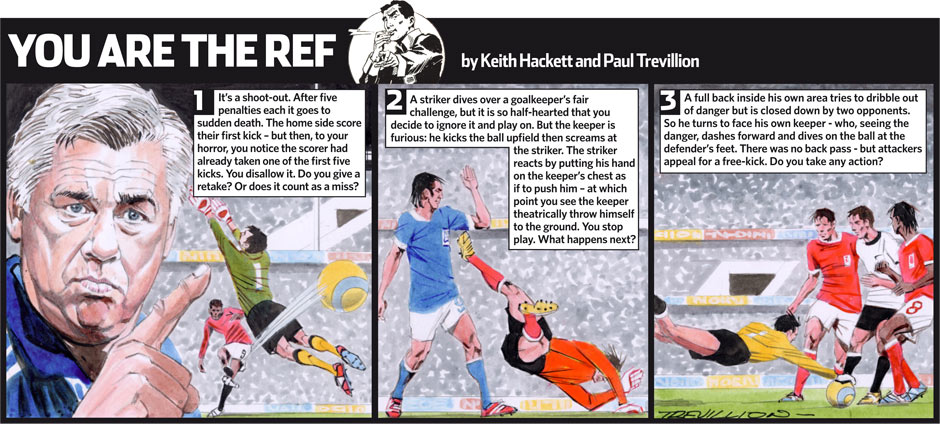
Click to enlarge, and debate the strip below the line
Keith Hackett's answers
1) You must be efficient when it comes to a shoot-out: you and your assistants are there to prevent messes like this. One of your assistants should be standing in the centre circle with the two teams, recording who is taking each kick. But clearly in this situation the system has gone wrong, so use common sense: having disallowed the goal, allow one of the player's team-mates to retake it. After all, you were at fault for allowing the kick to go ahead.
2) Think it through in stages. The striker's half-hearted dive did not deceive you, so you played on. With play then live, the striker intended to foul the keeper, but didn't go through with it. But the keeper has deliberately attempted to deceive you and get his opponent sent off by ostentatiously diving. So caution (yellow card) the keeper for unsporting behaviour, and restart with an indirect free-kick to the attacking team.
3) Yes. Back-pass is one of those often misunderstood terms – it doesn't have to be a deliberate passing gesture, nor does it have to go back. You need to consider: was the ball last played by a defender? Yes. Did the defender want the keeper to pick up the ball? Yes. So it counts as a back-pass: the defender has played the ball and has deliberately sought help from his keeper. Stop play as soon as the keeper picks it up and restart with an indirect free-kick.
-
95. Roberto Mancini, 2010
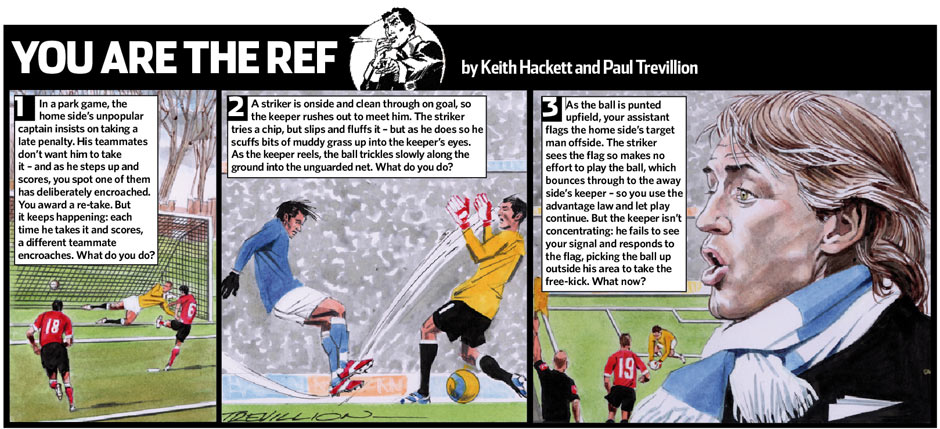
Click to enlarge, and debate the strip below the line. Keith Hackett's official answers appear in Sunday's Observer and here from Monday.Keith Hackett's answers
1) The law on encroachment is clear: once you have signalled for a penalty to be taken, if a member of the attacking team other than the kicker enters the penalty area, or goes within 9.15m of the penalty mark, or in front of the ball, you must let the kick go ahead, but award a retake if the ball enters the goal. The encroaching players are taking advantage of that just to make a point, so you must start to caution (yellow card) them. You must also extend time to allow for the retakes. If any of the kicks are missed and sufficient time is available, restart with an indirect free-kick to the defending team from where the encroachment occurred.
2) It's a goal. It's unfortunate, but you should base your decision on whether or not the striker deliberately hurled mud into the keeper's eyes. Clearly he didn't, so play on.
3) Stop play and restart with an indirect free-kick to the away team at the point where the home attacker was offside. You could have awarded a direct free-kick against the keeper for handball – he should play to the whistle, not the flag – but use common sense: the advantage you played has not ensued, so take play back to the offside offence. -
86. Michael Owen, 2009
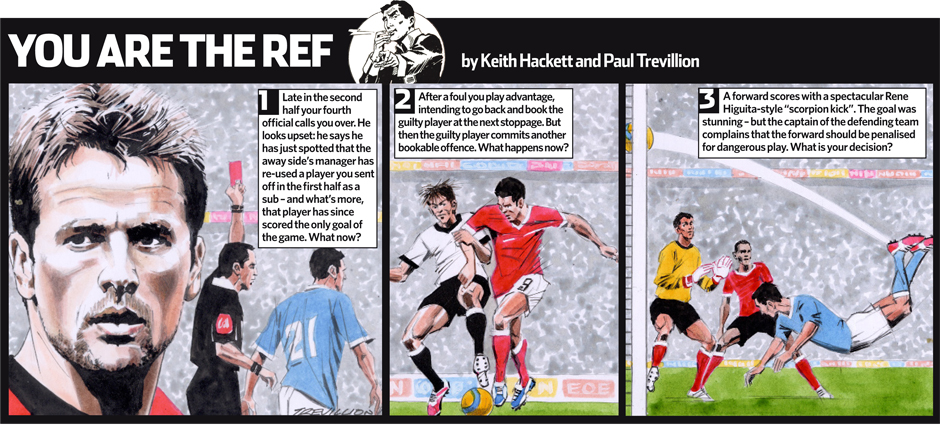
Click to enlarge. Keith Hackett's official answers:1) A nightmare. Ask the player to leave the field of play, restart accordingly and report the matter to the authorities afterwards. There's no other action you can take regarding the goal. After the game action would be taken against the player, the club and against you and the fourth official. It's awful officiating: before the start of the game you must obtain the names of the substitutes, and during it you and the fourth official must keep track of who has been substituted and who has been cautioned or sent off.
2) Stop play and issue a yellow card for the first offence, then a second yellow followed by a red for the second offence. It's a tough situation: you should be careful using advantage in circumstances like these – only play on if the advantage is clear. If it is, try to let the player know he has committed a cautionable offence in the first incident by shouting: "That was a yellow card. Advantage!". Preventative refereeing is always the best policy.
3) "Studs up" doesn't automatically mean dangerous play. Award the goal if you're happy there was no danger to an opponent. -
Originally posted by Poignant:
2) Stop play and issue a yellow card for the first offence, then a second yellow followed by a red for the second offence. It's a tough situation: you should be careful using advantage in circumstances like these – only play on if the advantage is clear. If it is, try to let the player know he has committed a cautionable offence in the first incident by shouting: "That was a yellow card. Advantage!". Preventative refereeing is always the best policy.
Meaning the ref should go to the player and show him Yellow twice then a Red?
-
Originally posted by sand king:
Meaning the ref should go to the player and show him Yellow twice then a Red?
yup, correct.
-
85. Andrey Arshavin, 2009
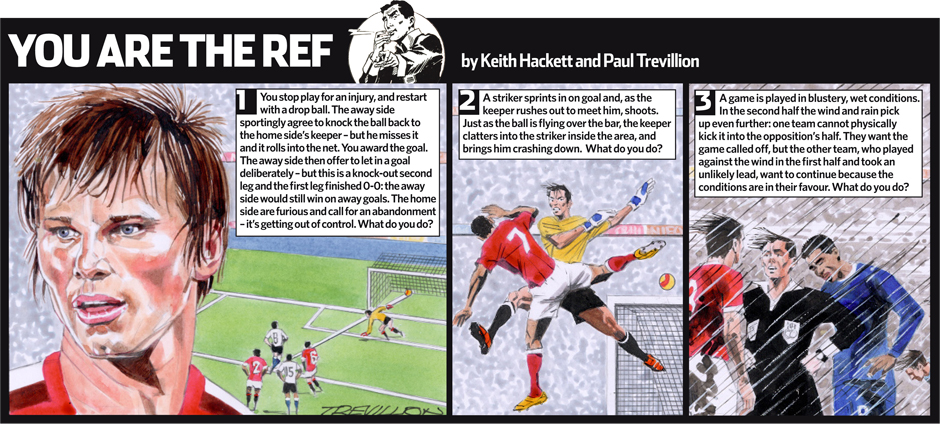
Click to enlarge. Keith Hackett's official answers:1) You cannot abandon the game in these circumstances: it is up to the authorities to decide what to do after the game has reached its conclusion. So you should bring both captains together, explain to them that the situation will be reviewed after the match, and tell them to complete the game. It's a real mess though, and shows the danger of allowing these manufactured restarts. Frankly I would have tried to stop play before the ball had entered the goal.
2) Award a penalty and show the goalkeeper a yellow card for unsporting behaviour. It is clear from the path of the ball that an obvious goalscoring opportunity has not been denied, so it's not a red.
3) An abandonment is entirely your decision. You should base your decision on whether the game has become a farce or dangerous to the safety of the players. In a league or cup game at the top level, the procedure for calling a game off is to approach the ground commander, tell him that you are going to abandon, and then play on for a few minutes in order to allow the police and stewards to prepare the safe exit of spectators. -
Originally posted by Poignant:
yup, correct.
Ah, I get it.
-
65. Steven Gerrard, 2007
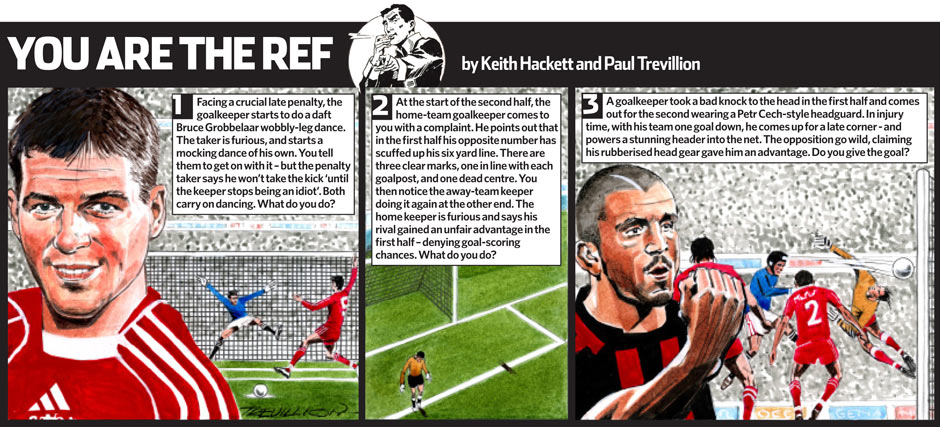
Click to enlarge.
Keith Hackett's official answers:
1) Don't join in the dancing - you must end this idiocy quickly. I would walk towards the two players, then stop halfway and request that they join me, which would put an immediate stop to the dancing. When I had their attention, I'd warn them in no uncertain manner that they were a disgrace and damaging the image of the game - and that if they did it again, they'd been booked for unsporting behaviour.
2) Book him for unsporting behaviour. Goalkeepers attempting to extend their vision of their goal in this way is a problem. Many years ago I was at one of my local grounds Stockbridge Works whose groundsman Big Jack took great pride in the state of the field of play. The first thing he'd do on a match day was go to the dressing rooms and make it very clear that any goalkeeper marking his pitch in this way would do so at his peril. At one particular game, he was so annoyed to see a goalkeeper ignoring his rule, taking huge divots out of the pitch, that Big Jack intervened in the half-time team talk to give the keeper a firm final warning. When the keeper then did it again in the second half, Big Jack strode onto the pitch and, with a straight right-hand punch, knocked the keeper spark out. He always regretted getting into trouble - but he'd always remind me of the story whenever I visited Stockbridge.
3) Yes, give the goal. You would already have inspected the
headgear at half time and approved it as safe and legal. -
Originally posted by Poignant:
85. Andrey Arshavin, 2009

Click to enlarge. Keith Hackett's official answers:1) You cannot abandon the game in these circumstances: it is up to the authorities to decide what to do after the game has reached its conclusion. So you should bring both captains together, explain to them that the situation will be reviewed after the match, and tell them to complete the game. It's a real mess though, and shows the danger of allowing these manufactured restarts. Frankly I would have tried to stop play before the ball had entered the goal.
Split second decision and reactions!
-
64. Luka Modric, 2009
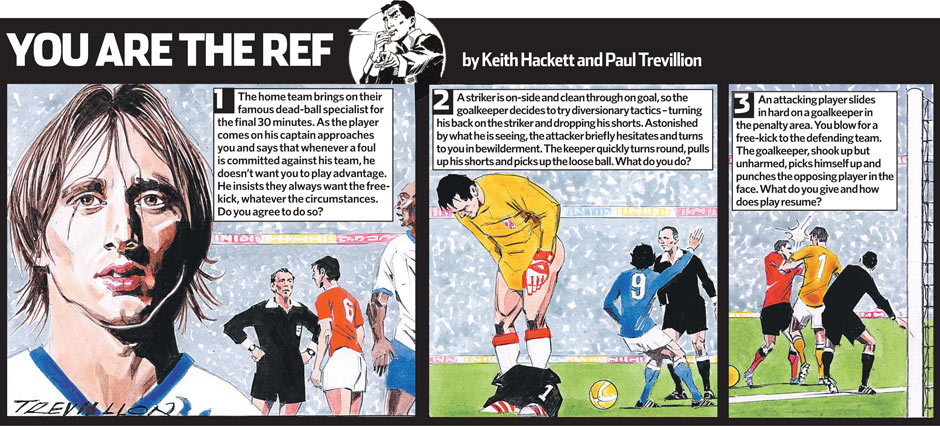
New strip, 2009. Click to enlarge.
Keith Hackett's official answers:
1) No. Only the referee can officiate and apply the laws of the game. The captain does not decide how you referee the game and therefore his request would be denied. Keith Hackett: I would also suggest that he gets on with playing the game and leaves the business of officiating to you.
2) Dismiss the goalkeeper. He has clearly committed a serious offence from which his team have benefited and, given the circumstances, his actions have denied an obvious goal scoring opportunity, so he must be shown the red card. Have the defending team choose someone to take over in goal and re-start play with an indirect free kick at the point inside the penalty area where he dropped his shorts.
3) Again you must dismiss the goalkeeper. However, as with the previous circumstances a team must have a goalkeeper and so, before restarting play, another player needs to go in goal and put on a distinguishing coloured jersey. Otherwise the game would have to be abandoned. Having blown for the initial offence on the goalkeeper you would restart play with a direct free kick to the defending team. -
55. Howard Webb, 2007
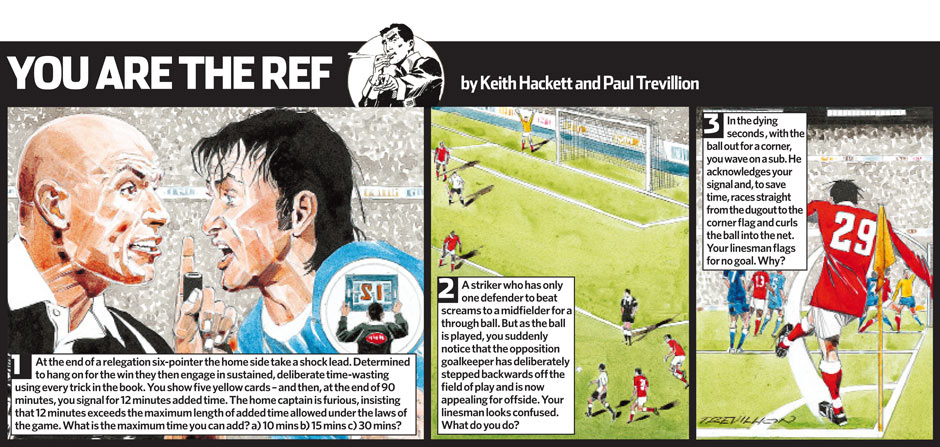
First published 2007. Click to enlarge.
Keith Hackett's official answers:
1) As everyone spotted - trick question: there's no limit to the amount of time you can add on. I'd pull the captain over and make him and everyone else aware that I would be staying until midnight to make sure the right amount of added time was played. If players continued to waste time, I would continue showing yellow cards and dismissing any repeat offenders. I'd also make it very clear to the captain that if this behaviour continued and his team went down to seven men as a result of my red cards, the game would be abandoned and he and his team would be reported to the authorities.
2) Allow play to continue - do not award an offside. Wait until the ball eventually goes out of play - for a goal, a throw, a corner, etc - and then book the goalkeeper for leaving the field of play without permission.
3) Because the sub hasn't entered the field of play before taking the kick. A substitution isn't complete unless the player has entered the field at the halfway line. The fourth official manages this process to ensure the law has been complied with. An alert referee would have intervened sooner in this situation to stop the player taking the corner. -
Originally posted by Poignant:
65. Steven Gerrard, 2007
Goalkeepers attempting to extend their vision of their goal in this way is a problem.
I don't understand this...
-
Originally posted by sand king:
I don't understand this...
i also dont really understand.
but i think it's some kind of way that some keepers use to extend their advantage.
____________________________________________________________________
ok luh, that's all for today.
enjoy

-
I want to see a referee kayu post also.
-
Originally posted by Poignant:
i also dont really understand.
but i think it's some kind of way that some keepers use to extend their advantage.
____________________________________________________________________
ok luh, that's all for today.
enjoy

Yeah, I wonder how does it help them haha!
Thanks for the posts!! -
97. Phil Neville, 2010
Click to enlarge, and debate the strip below the line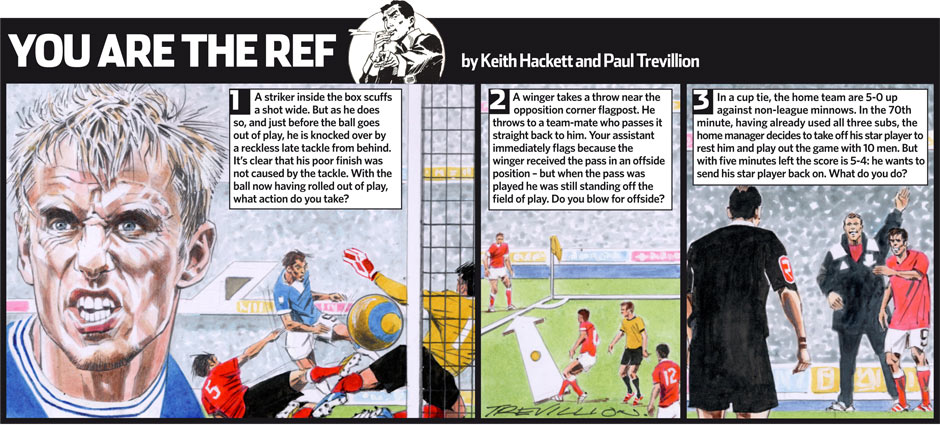
Keith Hackett's answers
1) Award a penalty and caution (yellow card) the defender for the reckless challenge. It's not a red card for denying an obvious goalscoring opportunity because the tackle came after the shot, which was not on target. And while the ball may be dead now, it's not too late to penalise the offence, which happened while play was live.
2) Although the player is temporarily off the field he is considered to be on the goalline for the purpose of this law. He's in an offside position and has become active, so your assistant's offside flag is correct.
3) Although the player has been off the field for 15 minutes, there's nothing in the laws to prevent him coming back on. It's a similar situation to a player who is off the field receiving lengthy treatment for an injury. So, however unusual the situation may seem, allow him back on. -
94. Mick McCarthy, 2010

Click to enlarge.Keith Hackett's answers
1) It may be obvious to everyone that it's a clean goal, but in law, you cannot give it: the moment the lights fail the ball is dead and play is considered to have stopped. Restart the game with a dropped ball. You should later report the incident to the authorities. At Uefa level all clubs must have an alternative electricity supply in place, which is confirmed before matches by the Uefa delegate.
2) The law states that the throw must be taken "from the point where it left the field of play" – and as the ball did not leave play on the top of a nearby hill, you should intervene before the player starts his run, and ask him to take it from the correct position. If he did take it before you intervened, you should award a foul throw, giving the throw to the opposition.
3) Send him to the stands. When a player is sent off he is not allowed to take part in the game again, even as a manager. He should not be allowed to stand either at the side of the pitch or in the technical area. -
92. Jermain Defoe, 2009

Click to enlarge.
Keith Hackett's answers
1) Order the kick to be re-taken. As soon as the goalkeeper moves off his line you must be ready to act. Base your decision on the outcome of the kick. If the kick is scored, award the goal. If it is missed, as in this scenario, award a re-take.
2) His team now has only two substitutions remaining. They could have replaced the striker immediately, before you signalled for kick-off, in which case they would have been allowed to nominate another substitute. But they left it too late.
3) Award the goal, and tell the home manager to cool down. Explain clearly that the law has not been broken. The assistant is allowed to run inside the touchline. However, they are advised not to, because it looks untidy and can interfere with play – it's not good practice, so you should also have a word with your assistant and agree on where he should run.

